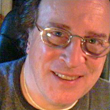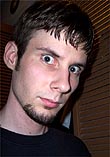|
|
 
|
|
Author
|
Topic: New Anti-Piracy System for Theatres
|
Mark Lensenmayer
Phenomenal Film Handler

Posts: 1605
From: Upper Arlington, OH
Registered: Sep 1999
|
 posted 11-11-2004 09:35 AM
posted 11-11-2004 09:35 AM




I'm sure this will be the end of piracy as we know it ![[Wink]](wink.gif) . Now, if we can just figure out who pays for this. I'm sure the exhibitors would love this additional expense!!! . Now, if we can just figure out who pays for this. I'm sure the exhibitors would love this additional expense!!!
Pirate Eye Website
Tom's Hardware Guide Article
quote:
PirateEye detects concealed video cams in movie theaters
By Wolfgang Gruener, Senior Editor
November 10, 2004 - 16:38 EST
Los Angeles (CA) - A Florida firm claims to have found a solution for the movie industry to prevent bootlegging in theaters. Trakstar demonstrated its Pirate Eye technology, which uses light impulses to detect video recording devices and TVS, a sophisticated audio watermarking system.
In Howard Gladstone's view, the end of in-theater piracy is just a matter of time. Gladstone, president of Trakstar, demonstrated a rather creepy sounding technology apology this week in Hollywood in front of an audience mixed of movie industry representatives and journalists. His "PirateEye" monitoring system is able to reliably detect recording devices which can be used for bootlegging. This includes video cameras but also cell phones with video recording capabilities.
"PirateEye scans a complete theater room three times during a presentation," he said. The device is remote controlled and uses light impulses to find recording devices, including pinhole camcorders. According to Gladstone, the audience does not notice the scanning progress. "The impulses are only 20 ms in length. Neurons in the brain need about 40 ms to recognize the light source. And the head normally will turn after 200 ms."
A second part to Trakstar's anti-piracy solution is TVS which implements watermarks in audio signals. These watermarks are recorded in bootlegs and easily can be retrieved again, when pirated content is offered for download on the Internet or file-sharing services. "We are able to extract the data even after multiple analog re-conversions and copies. This allows us to determine where and at which time the copy originally was created."
Expectedly, there is "great interest" for the technology from the movie industry, according to Gladstone. Currently, several large firms evaluate his proposals, he said.
However, there was no decision yet, if and which technology could be used. So far, a reasonable business model has not been determined and there is no agreement on who should pick up the cost of the technology implementation. Gladstone however believes that his system would be ready for installation by mid of 2005, if the movie industry chooses to use his technology.
| IP: Logged
|
|
|
|
|
|
|
|
|
|
|
|
All times are Central (GMT -6:00)
|
|
Powered by Infopop Corporation
UBB.classicTM
6.3.1.2
The Film-Tech Forums are designed for various members related to the cinema industry to express their opinions, viewpoints and testimonials on various products, services and events based upon speculation, personal knowledge and factual information through use, therefore all views represented here allow no liability upon the publishers of this web site and the owners of said views assume no liability for any ill will resulting from these postings. The posts made here are for educational as well as entertainment purposes and as such anyone viewing this portion of the website must accept these views as statements of the author of that opinion
and agrees to release the authors from any and all liability.
|

 Home
Home
 Products
Products
 Store
Store
 Forum
Forum
 Warehouse
Warehouse
 Contact Us
Contact Us




 Printer-friendly view of this topic
Printer-friendly view of this topic





![[Wink]](wink.gif) . Now, if we can just figure out who pays for this. I'm sure the exhibitors would love this additional expense!!!
. Now, if we can just figure out who pays for this. I'm sure the exhibitors would love this additional expense!!!


![[bs]](graemlins/bs.gif) to me.
to me.
![[thumbsdown]](graemlins/thumbsdown.gif)




